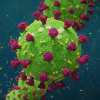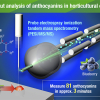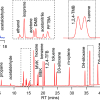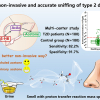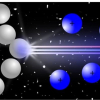The most widely used approach to testing for COVID-19 requires a polymerase chain reaction (PCR) test, which involves taking a swab of the back of the throat and far inside the nose. New research by chemists from the University of Surrey, Frimley NHS Trust and the Universities of Manchester and Leicester involved the collection of sebum samples from 67 hospitalised patients—30 who had tested positive for COVID-19 and 37 who had tested negative. The samples were collected by gently swabbing a skin area rich in sebum, such as the face, neck or back. The samples were analysed by liquid chromatography mass spectrometry (LC-MS) and partial least squares-discriminant analysis (PLS-DA) to differentiate between the COVID-19 positive and negative samples.
The Surrey team then found that patients with a positive COVID-19 test had lower lipid levels, or dyslipidemia, than their counterparts with a negative test. The accuracy of the study’s results increased further when medication and additional health conditions were controlled.
Dr Melanie Bailey, co-author of the study from the University of Surrey, said: “Unfortunately, the spectre of future pandemics is firmly on the top of the agenda for the scientific community. Our study suggests that we may be able to use non-invasive means to test for diseases such as COVID-19 in the future—a development which I am sure will be welcomed by all.”
Matt Spick, co-author of the study from the University of Surrey, said: “COVID-19 damages many areas of metabolism. In this work, we show that the skin lipidome can be added to the list, which could have implications for the skin’s barrier function, as well as being a detectable symptom of the disease itself.”
Dr George Evetts, Consultant in Anaesthesia & Intensive Care Medicine at Frimley Park Hospital, said: “Investigating new methods of diagnosis and surveillance in a new disease such as COVID-19 that has had such a devastating effect on the world is vital. Sebum sampling is a simple, non-invasive method that shows promise for both diagnostics and monitoring of the disease in both a healthcare and a non-healthcare setting.”





